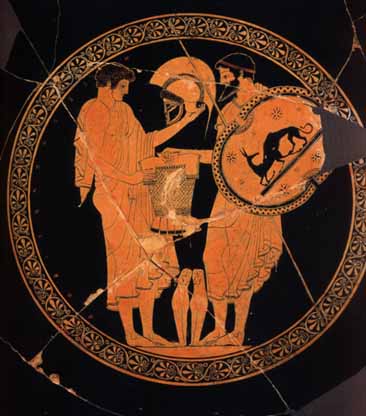2021.10.18 | By Gregory Nagy

This brief essay is a continuation of my ongoing research centering on myths about a competition between Ajax and Odysseus that resulted in the awarding of the armor of Achilles, after that hero’s death in the Trojan War, to Odysseus instead of Ajax—a myth already attested in Odyssey 11 as also in surviving plot-summaries of the so-called Epic Cycle. In the course of this research, I had noticed a curious fact about related myths covering an epic frame of time after Ajax is already dead, having committed suicide out of disappointment over losing to Odysseus—a time when Odysseus is in full possession of the armor. The fact is, I found no attestation, direct or indirect, of any epic scene within that frame of time where Odysseus is shown actually wearing the armor of Achilles. There are, yes, attestations of epic scenes where Odysseus hands over the armor to the son of Achilles, Neoptolemos/Pyrrhos, after that hero enters the Trojan War, and I show, above this paragraph, a striking illustration of such a scene as pictured in a vase painting. In the case of such attestations, the question arises: was the father’s armor given to the son as a gift by Odysseus? Or was this armor merely on loan, as it were? Or, much more likely, did there exist a variant myth where Odysseus never gave away the armor of Achilles for Neoptolemos/Pyrrhos to wear? In two overlapping essays where I considered such questions, I noted the existence of a mythological variant where Odysseus got to keep the armor, even if he never wore it—only to lose it to the dead Ajax in the course of a seastorm during his sea voyage back to his homeland in Ithaca. In line with my current plan to undertake a rewriting, in Classical Continuum, of a whole series of essays I posted in Classical Inquiriesfocusing on the hero Ajax, I start the project here by rewriting a single paragraph where the two essays I just mentioned overlapped exactly (§10 in Nagy 2021.05.17 and §4 in Nagy 2021.06.01). I am not yet certain about where I will situate this rewritten paragraph, no longer to be duplicated in the overall project that I am planning, but I already know the changes to be made. The most important of these changes is an addition to the earlier text: I now quote and translate, literally, three relevant ancient sources: one is a passage from Pausanias and the other two are poems from the Greek Anthology. What follows, then, is a rewriting of that one paragraph, which now includes the texts of the three sources. Here, then, is a new version of my originally duplicated old paragraph:
There can be some doubt about any ultimate victory for Odysseus over Ajax, in the light of an Aeolian myth reported by Pausanias (1.35.4), and there are further references in the Greek Anthology, epigrams 9.115 and 9.116: as Odysseus was sailing back home from Troy, a storm caused the armor of Achilles to fall overboard and get swept away by the currents of the sea, which carried back this treasure to the shores of the Hellespont at Troy—all the way to the headlands of Rhoiteion, dominated by a tumulus housing the body of the hero Ajax.
Here are the three sources:
Pausanias 1.35.4:
λόγον δὲ τῶν μὲν Αἰολέων τῶν ὕστερον οἰκησάντων Ἴλιον ἐς τὴν κρίσιν τὴν ἐπὶ τοῖς ὅπλοις ἤκουσα, οἳ τῆς ναυαγίας Ὀδυσσεῖ συμβάσης ἐξενεχθῆναι κατὰ τὸν τάφον τὸν Αἴαντος τὰ ὅπλα λέγουσι·
I heard a tale of the Aeolians who settled in Ilion [= Troy] at a later time [= after the destruction of Troy]. It is about the judgment involving the armor [of Achilles]. They tell this tale: when Odysseus experienced a shipwreck, the armor [of Achilles that was transported on the ship] was washed ashore at the tomb of Ajax.
Greek Anthology 9.115:
Ἀσπίδ’ Ἀχιλλῆος, τὴν Ἕκτορος αἷμα πιοῦσαν,
Λαρτιάδης Δαναῶν ἦρε κακοκρισίῃ·
ναυηγοῦ δὲ θάλασσα κατέσπασε καὶ παρὰ τύμβον
Αἴαντος νηκτὴν ὥρμισεν, οὐκ Ἰθάκῃ.
The shield of Achilles, the one that was glutted with the blood of Hector,
it did the son-of-Laertes [= Odysseus] lift and carry off as a prize, because of the Danaans [= Achaeans]—all because of their bad judgment.
But when his ship was breaking up, the [stormy] sea pulled it [= the shield of Achilles] under, and it rushed toward the tomb
of Ajax. It [= the shield] was swimming in that direction, headed to that place and not to Ithaca.
Greek Anthology 9.116:
Ἀσπὶς ἐν αἰγιαλοῖσι βοᾷ καὶ σῆμα τινάσσει
αὐτόν σ’ ἐκκαλέουσα, τὸν ἄξιον ἀσπιδιώτην·
“Ἔγρεο, παῖ Τελαμῶνος, ἔχεις σάκος Αἰακίδαο.”
The shield is now on the shore [of the Hellespont]. And it roars, causing the tomb [of Ajax] to tremble.
It [= the shield] calls out to him [=Ajax], that worthy shield-bearer:
“Awaken [from death], son-of-Telamon [= Ajax]. Here for you to have and to hold is the shield of the descendant-of-Aiakos [= Achilles].
Bibliography
Nagy, G. 2021.05.24. “How a Classical Homer occasionally downgrades the heroic glory of Ajax in order to save it: Part 1.” Classical Inquiries. https://classical-inquiries.chs.harvard.edu/how-a-classical-homer-occasionally-downgrades-the-heroic-glory-of-ajax-in-order-to-save-it-part-1/.
Nagy, G. 2021.06.01. “How a Classical Homer occasionally downgrades the heroic glory of Ajax in order to save it: Part 2.” Classical Inquiries. https://classical-inquiries.chs.harvard.edu/how-a-classical-homer-occasionally-downgrades-the-heroic-glory-of-ajax-in-order-to-save-it-part-2/.
Nagy, G. 2021.06.07. “How a Classical Homer occasionally downgrades the heroic glory of Ajax in order to save it: Part 3.” Classical Inquiries. https://classical-inquiries.chs.harvard.edu/how-a-classical-homer-occasionally-downgrades-the-heroic-glory-of-ajax-in-order-to-save-it-part-3/.